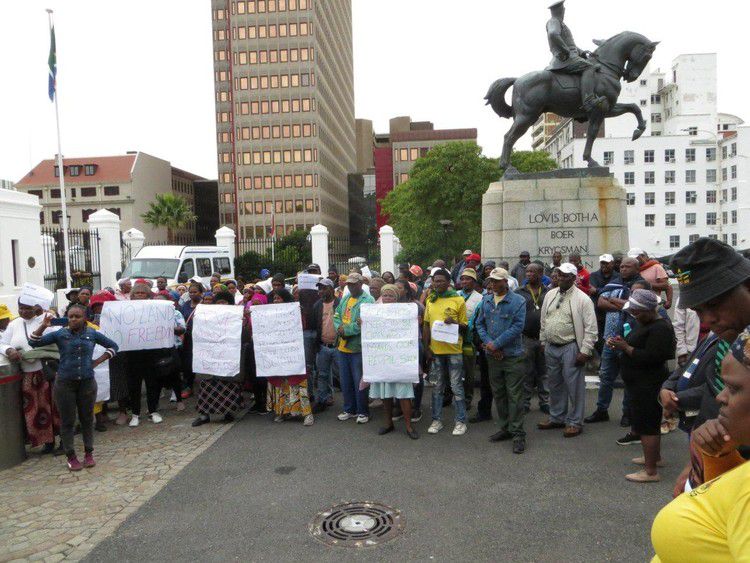Article originally published on GroundUp By Vincent Lali
- Families living in old houses with asbestos roofs in Makhaza, Khayelitsha, have asked the national Department of Human Settlements to fix them.
- A project to fix the houses was interrupted by the Covid pandemic.
- Some of the families marched to Parliament last month.
- They were joined by other protesters from Makhaza who were demanding title deeds to houses they moved into in the 1990s.
- The provincial housing department says it will liaise with the national department to resume the repair of the houses.
Families living in houses built in the 1990s have demanded that the national Department of Human Settlements remove asbestos roofs and replace them.
Last month about 150 residents of Makhaza, Khayelitsha, marched to Parliament to demand that the national Department of Human Settlements give them title deeds and relaunch a project to replace their old asbestos roofs with zinc sheeting or tiles.
ALSO READ: Nelson Mandela Bay mayor suspects cable theft as “sabotage”
They held up placards that read: “”We want our title deeds” and “Asbestos need to be changed” as they sang struggle songs outside Parliament.
Some of the residents have been staying in houses which are not registered in their names for over three decades.
Some, like community leader Nolitha Nyoka, moved into empty houses intended for people evicted from nearby Mandela Park in the 1990s.
When some of the families for whom the houses were intended rejected the houses, the buildings were quickly occupied by backyarders from Makhaza, with the help of ward councillors at the time.
Some of the families marched to Parliament last month
“The houses are still registered in the names of the residents who rejected them. We never received title deeds,” said Nyoka. She said attempts to get title deeds had failed.
But now some of those who rejected the houses are returning to claim them because they have not been able to get houses elsewhere, since the record shows they already have houses.
ALSO READ: March in Khayelitsha to mark 10 years of Khumbulani Pride
On 5 April Nyoka received an eviction order from the registered owner of the house, she said.
Nyoka said: “I can’t vacate the house now because I have been staying in it for 21 years. I raised my kids in that house, renovated and extended it and fenced the yard.” Renovating and extending the house and fencing the yard had cost her about R100,000, she said.
Muneera Allie, spokesperson for the Western Cape Department of Infrastructure, said the department and the City of Cape Town would “approach the National Department of Human Settlements regarding a policy change” in order to resolve the title deeds problem.
“The key challenge is that the properties were transferred in the early 1990s and require the consent of those registered title deed holders to effect transfer to the current occupants,” she said.
Allie said, “In the absence of such consent, the matter requires either a Court to sanction the transfer, or a possible amendment to the Housing Act.”
Asbestos
Meanwhile many families in Makhaza live in houses roofed with damaged and old asbestos, said Ward 95 Councillor Lucky Mbiza (ANC).
The government had rolled out a project to replace the asbestos with tiles and zinc sheeting in 2018, but it stopped because of Covid regulations in 2020.
ALSO READ: Khayelitsha community is finally getting a temporary police station
“We want the government to restore the project,” he said.
Siyabulela Phezi said the house which he and his wife moved into in 1992 needed fixing. The asbestos roof is damaged and the rain comes in to drench his furniture, he said. “I want government to replace the old asbestos with zincs because I have no money to buy material to roof my house again,” said the pensioner.
Allie said the provincial department “did not have a specific project to remove asbestos in Makhaza”.
The department had introduced the Kuyasa Housing Retrofit Project in 2018 to fix 2,373 houses. “Repairs included the replacement of damaged zinc roofing structures, the installation of ceilings, doors and windows, and electrification,” she said.
More than 430 units had been repaired in the first phase of the project but then the project was put on hold, she said, as budgets were reallocated due to the Covid-19 pandemic.
ALSO READ: Report raises alarm over state of provincial nature reserves
Subsequently, the “Department re-prioritised its budget allocation to the provisioning of basic services and the upgrading of informal settlements,” she said.
She said the department would review the issue in terms of “its current funding availability” and “would need to engage with the National Department of Human Settlements.”
Questions sent to Nozipho Zulu, head of communications at the national Department of Human Settlements, had not been answered at the time of publication.
CLICK HERE TO READ MORE ARTICLES BY GROUND UP

